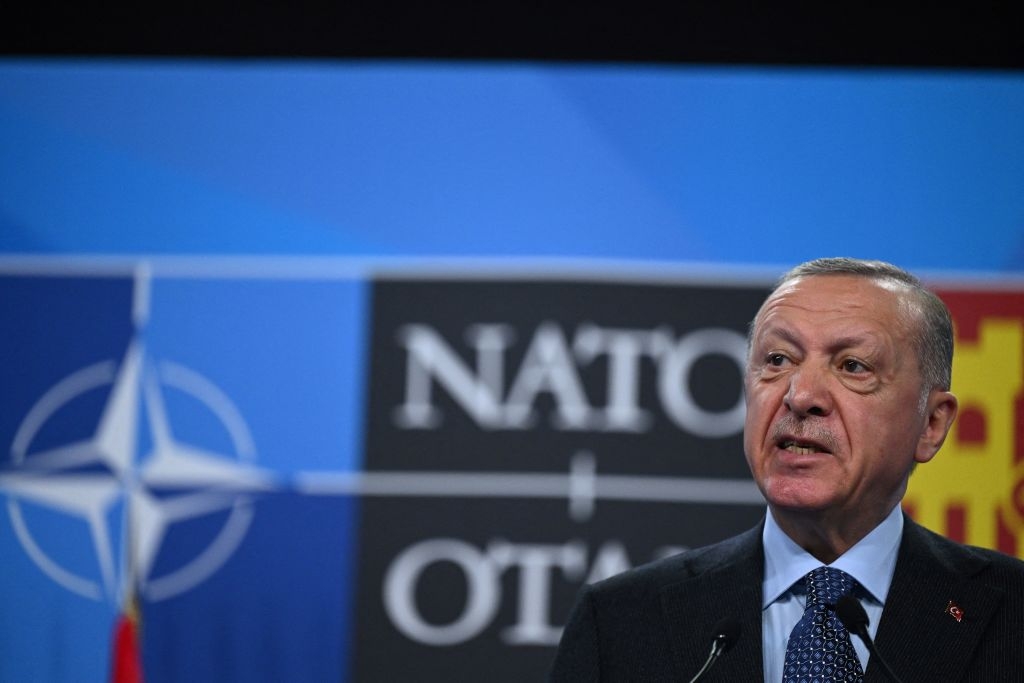
Turkish President Recep Tayyip Erdoğan's ideological family tree is inherently anti-Western-- hence, anti-US and anti-NATO. This author's most recent article, "NATO Family Picture in Madrid: This Will Not Be Erdoğan's Last Blackmail," was posted on July 7. Only 11 days later, on July 18, Erdoğan said that Turkey would freeze Finland and Sweden's NATO membership bids if the Nordic countries do not come into line with Turkey's "fight against terrorist organizations."
That might be a tough task for Finland and Sweden. In 2019, Erdoğan notoriously called half of Turks (those who do not vote for him) terrorists. The same year, Erdoğan declared the pro-Kurdish People's Democracy Party a terrorist entity. In parliamentary elections in June 2015, that party won 13% of the national vote and 80 seats in the Turkish parliament. Nevertheless, in 2021, Erdoğan stated that the students who peacefully protested his appointment of a rector to Boğaziçi University were "terrorists." The Nordics may find it somewhat difficult to cooperate with Erdoğan and chase 40 million-plus Turkish terrorists in addition to tens of millions of Kurds living in Turkey, Iraq, Syria -- and Europe.
On May 17, Erdoğan announced that Turkey would veto Sweden and Finland's bids for NATO membership, and accused them of hosting Kurdish (and other) terrorists. Under pressure from NATO allies, he conditionally removed his veto at the June 29 NATO Summit in Madrid . If Sweden and Finland do not wholeheartedly fight everyone Erdoğan deems a terrorists, does that mean he will veto their membership?
Take, for instance, the notorious case of Osman Kavala, a millionaire philanthropist and human rights activist who has been in prison for the past five years on flimsy charges of sponsoring terrorism and riots against Erdoğan's government, espionage, and a rich fictional catalogue of other crimes.
On July 11, the European Court of Human Rights (ECHR) published its decision regarding Turkey's rigid failure to release Kavala, sentenced to life in prison in May. The court ruled that Turkey had violated a previous judgment from the ECHR in the case of Kavala vs Turkey from December 2019 that called for Kavala's release. It is rare for the court to explicitly reprimand a state for failing to abide by a decision. As it was ministers from the Council of Europe (CoE) who referred the case back to the court in February, the ECHR's decision is seen as moving the CoE a step closer to suspending Turkey as a member, or expelling it as they did Russia after it invaded Ukraine.
Kavala was acquitted on all charges but, as Erdoğan publicly insists that he is a "traitor," he was not released from prison. Upon his acquittal, a prosecutor instantly produced a new indictment against him.
If, in this case, Kavala would have escaped the Turkish dungeons and appeared in Sweden or Finland, Erdoğan would probably insist on his extradition before he gives the green light to the Nordics joining NATO. This can be what will happen to anyone Erdoğan might view as a terrorist who, in fact, is just someone who opposes the Sultan's Islamist rule.
Erdoğan's calculus has no limits. He refers to the PKK when he is talking about "Kurdish terrorists." He is right that the PKK's violent separatist campaign since 1984 has claimed more than 40,000 lives in Turkey; the victims were both Turks and Kurds. Turkey, the U.S. and European Union -- including Finland and Sweden -- have officially banned the PKK for being a terrorist entity. Where is the PKK is legal? In Erdoğan's "strategic ally," Russia. Any objections to Putin? Not on your life.
Kavala is not a terrorist. If Erdoğan wants to fight terrorism, he should not torture a liberal philanthropist by keeping him in solitary confinement despite his acquittal. Instead, Erdoğan should rethink, specifically drop, his plans for a new military incursion into Syria -- and not add to Turkey's military build-up in Syria– just to win a handful more of nationalistic votes in elections next year, on the assumption that a new military campaign in Syria would earn him critical votes from nationalist Turks.
There are reports that Pentagon officials are increasingly concerned about a new Turkish military invasion in northern Syria and have begun planning for how it could impact the U.S. fight against the Islamic State (ISIS) terrorist group. The main concern, is that any Turkish military movement into Syria would draw the U.S. partner, the Kurdish-led Syrian Democratic Forces (SDF), away from the battle against ISIS, the officials said.
"We strongly oppose any Turkish operation into northern Syria and have made clear our objections to Turkey," said Dana Stroul, Deputy Assistant Secretary of Defense for the Middle East. "Such an operation puts at risk U.S. forces' coalition campaign against ISIS and will introduce more violence into Syria."
The West should tell Erdoğan it is ISIS, not men like Kavala, that is the terror threat to civilization.
Burak Bekdil, one of Turkey's leading journalists, was recently fired from the country's most noted newspaper after 29 years, for writing in Gatestone what is taking place in Turkey. He is a Fellow at the Middle East Forum.


